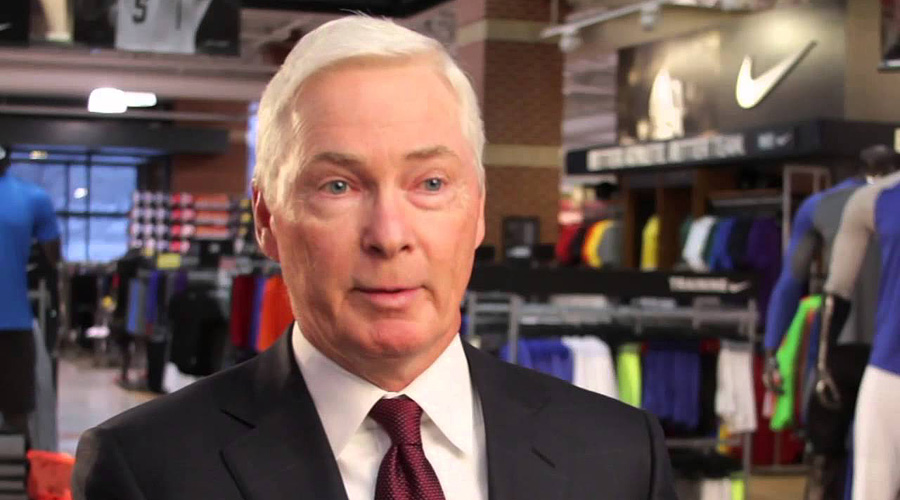At a session, “Company Conscience: Leading With Conviction,” at the NRF Big Show in New York City, Ed Stack, chairman and CEO at Dick’s Sporting Goods, discussed the retailer’s efforts to ensure a work/life balance for its employees and the retailer’s commitment to community that’s reflected both in its Sports Matter funding program and controversial decision to change its gun policy.
At the event, Stack provided an emotional recall on the company’s decision around guns.
On February 28, 2018, Stack in an open letter and on Good Morning America announced the retailer would be ending the sales of high-capacity magazines and sales of guns to people under 21 years old. The decision followed the Febuary-14 Parkland, FL. school shooting.
Sales of assault-style weapons had been removed from the core Dick’s banner after the Newtown, CT school shooting in 2012 but the company’s 35 Field & Stream stores were still selling them.
At the NRF session, Stack said the decision to further restrict gun sales was in part a culmination of several recent mass shooting incidents, He cited Newtown, the church shooting is Sutherland Springs, TX, as well as high-profile shootings in San Bernardino, Orlando and Las Vegas. But Parkland delivered an emotional blow.
Said Stack, “When that happened in Parkland, it was so emotionally moving for me and my wife to watch those kids and parents who had just the worse nightmare ever.”
The shooting also came close to home for the company when Dick’s found out that the retailer had sold the shooter a hand gun two months before the shooting. Stack said, “It wasn’t the gun that was used in the shooting but it could have been. It was at that point that I said, “This system is not working and we need to say something and we need to do something.’”
Stack added, “I’m a bit of a hard ass but that weekend I watched those kids and those parents and I hadn’t cried that much since my mother passed away. I knew we had to do something.”
The Monday after the incident Stack came to work with a statement he had written up for his team that included raising the gun-buying age to 21 and ending sales of assault-style rifles. After initially expecting to announce the news via social channels, Dick’s decided to make a statement on the change with the open letter and prime TV coverage.
Stack added, ”People talked about it as a tough decision but actually it wasn’t because the right decisions are never tough decisions.”
He said the decision to change its gun policy has had “a significant impact on our business” with some gun enthusiasts boycotting the retailer. Comps at its stores fell 3.9 percent in the third quarter. Over half of the decline was due to weakness in hunting categories as well as its electronics department that is being phased out.
Stack still believes the company has “kind of gone through” the fallout phase from the decision. He noted that Dick’s in the third quarter raised its EPS guidance for the third quarter in a row. Stack also said that after the third quarter, he went back and talked on his key personal, and “everybody on our board and our management said they would make the decision all over again. The right decisions are easy decisions to make.”
At the session, Matthew Shay, president and CEO of the National Retail Federation (NRF), described Dick’s firearms decision as the “personification of leadership with conviction.” Stack received two rounds of applause during his explanation of the decision.
During his broader discussion on leadership, Stack admitted he “never really wanted to be in the business” when he got out of college when the company his father founded had only two stores. But his father become “quite sick,” he become more involved, and he “quickly fell in love with retail, fell in love with the business.”
Stack has since guided the company to about 730 stores but he said one key to his success has been hiring quality people and strong partnerships.
“The one thing everybody knows and I know extremely well is you don’t do it alone,” said Stack. “It takes a great management team. Our management teams have grown and changed over the years but we’ve been fortunate and blessed to have great people working with us who really cared and were interested in the business. We have great partnerships with the vendors that we do business with. So it was really a big effort by a lot of people to get Dick’s to where it is right now.”
Family-Values Support Dick’s Culture
Asked about values in the business, Stack said despite its size, the company still tries that retain the “family values” the business was originally built on in Binghamton, NY.
“Family is really very important to us,” said Stack. “We’re very much a performance-based culture also – you got to get the job done, you got to hit the numbers. But family is really important. We try to instill the ability to have a work-life balance.”
In particular, Stack said the companies stresses the importance to employees to make time for family, including not regretting missing out on any open houses, the piano recital or baseball game. Said Stack, “We start pretty early. If you show up at our place, we start about 7.15 or 7 30. If you show up at 8:00, you’re kind of parking in the back of the parking lot. But come around 6:00, the parking lot is pretty empty. People are going back home to be with their families. We think that’s important to do.”
Stack also said community has long been important to the company and that started with his father’s support of local sports teams in Binghamton and has continued today with numerous programs, including Sports Matter. Since 2014, Dick’s has pledged more than $50 million to support teams and leagues in need, while working to raise awareness of the importance of youth sports across the country through the Sports Matter campaign.
Asked about the challenges around sports funding, Stack noted that Dick’s studied the issue a few years ago and found that $4 billion in funding for youth sports programs had been cut out of school budgets across the country. By about 2021, a quarter of public high schools in the U.S. are expected to be without a sports program. Added Stack, “If you think about it, that’s catastrophic for our kids.”
He said kids “need a place to go after school where they’re supervised, where they feel like they belong, like they’re making a difference. And to have these sports programs and other extra-curricular activities are important in school. When kids play sports and other extra-curricular activities, there’s a higher chance to go to college and they get better grades. There’s less teenage pregnancies, less alcohol and drug use and all of those things. It’s a real problem in the country today.”
Asked about his overall leadership strategy, Stack said, “Some of it’s kind of what everybody’s heard before. You have to lead with your heart and what you think is the right thing to do is what you should do. You’ve got to get your people to understand the strategy and understand the tactics and get people who really believe in what you’re doing. And in our company today we believe that not only do we have a P&L to take care of of and an earnings stream that we have to provide to our shareholders but we’ve been blessed in what we’ve been able to do for communities. We really feel it’s important that we give back to the community and stand up for what we think is right, which is what we did after the shooting in Parkland and what we’ve done with Sports Matters. Leadership is pretty easy if you just stay on the right path.”
Other speakers at the session included Hubert Joly, chairman and CEO of Best Buy, and Chip Bergh, President and CEO of Levi Strauss & Co
Best Buy’s Values Authenticity In Leadership
Joly described his five “be”’s of leadership:
- Be a purposeful leader: Said Joly, “Be clear about what drives you as an individual and what’s the meaning of your life and how it connects you to the company.”
- Be clear about your role as a leader: Said Joly, “If your role is to be the smartest person in the room and to make sure everybody knows you’re the smartest person in the room, that’s a problem. Your role as a leader and I’ve learned this over the years is to create an environment in which others can be successful.”
- Be clear about who you’re serving: A good leader focuses on serving the customers, not themselves or their “boss.”
- Be a values-driven leader: Joly believes Best Buy’s renewed commitment around integrity has helped reduced employee turnover.
- Be an authentic leader: Be the “true version of yourself” and bring the same qualities to work as you do at home.
One effort embracing many of these leadership guidelines was the move last year to take the proceeds from the 2017 tax reform to invest in additional benefits for employees, including a child care backup service.
But Joly said a successful company must be about more than making money. He said, “You have to make money to be in business, but the purpose is to contribute to our customers, employees, shareholders and the communities we’re in. Magic happens when you can align people with the purpose of the company.”
Levi Strauss Takes On Social Issues
Chip Bergh, president and CEO of Levi Strauss, noted that the company has a “long history of not being afraid to take stands on social issues. We desegregated our factories in the South 10 years before that was the law, and we were one of the first companies to provide benefits to same-sex partners.”
Levi’s also has opposed the Trump administration’s Muslim travel ban and its rescinding of protection for the DACA “Dreamers” program. And even though the brand “doesn’t have a dog in the fight” in the gun debate, since it neither manufactures nor sells firearms, “I believe it’s one of the biggest social issues of the day,” said Bergh.
“I have a 10-year-old daughter who practices lockdown drills in her school,” Bergh noted. “For kids and young adults, this is the defining issue of their life, and that’s why we provide financial backing for organizations fighting gun violence. I think my employees expect it of me to take stands.”
Last September, Levi’s pledged more than $1 million in four years to activists and nonprofits fighting for gun control.
Bergh reflected on how social changes are affecting the role of a corporate leader: “I think the CEOs of major corporations, and the companies, have a responsibility to give back,” he noted. “And if you do it in an authentic way, consumers will reward you.”
Image courtesy of Dick’s Sporting Goods
















